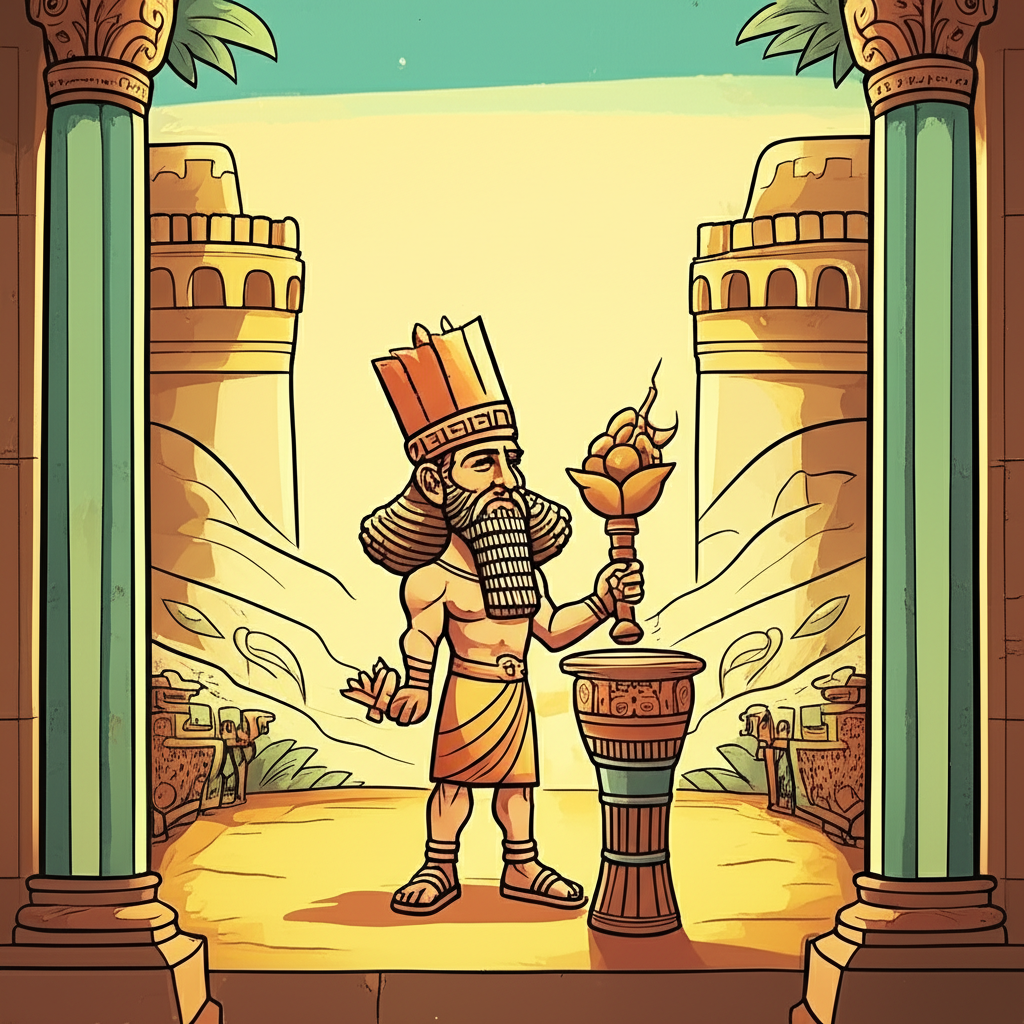
In the sun-baked lands between the Tigris and Euphrates rivers, in the cradle of civilization known as Mesopotamia, ancient storytellers wove tales of gods who walked among mortals and wielded immense power. These narratives, passed down through generations in the form of cuneiform tablets and oral traditions, offer a fascinating glimpse into the worldview of people who sought to understand the chaotic forces of nature and the complexities of human existence. Among these enduring legends is the epic of Utnapishtim and the cataclysmic flood, a story deeply intertwined with the pronouncements of the powerful sky god, Enlil.
The era in which these myths flourished was one of profound reverence for the natural world. The Sumerians, Babylonians, and Assyrians, who inhabited this fertile crescent, lived at the mercy of the rivers, the sun, and the unpredictable storms that could bring both life-giving water and devastating destruction. Their understanding of the cosmos was anthropomorphic; they envisioned the gods as powerful beings with human-like emotions and motivations, presiding over different aspects of existence. The heavens, the earth, the underworld, and the very fabric of society were all believed to be under divine dominion. In this context, a catastrophic flood was not merely a natural disaster, but a potent demonstration of divine displeasure, a cosmic judgment.
Central to this particular narrative is Enlil, a preeminent deity in the Mesopotamian pantheon. Enlil was often depicted as the king of the gods, the lord of the wind, the earth, and the air. His domain encompassed the thunderous storms, the mighty rivers, and the very breath of life. He was a figure of immense authority, capable of both creation and destruction. His power was absolute, and his decisions, once made, were often irreversible. Symbolically, Enlil represented the raw, untamed forces of nature and the ultimate arbiter of destiny. He was the embodiment of divine will, sometimes depicted as wise and just, but also prone to anger and swift, decisive action. His pronouncements could bring about prosperity or utter devastation, mirroring the unpredictable cycles of the natural world that so profoundly shaped the lives of the ancient Mesopotamians.
The story, as it is retold in the epic poem The Epic of Gilgamesh, unfolds against a backdrop of divine deliberation. The gods, gathered in their celestial assembly, found humanity to be too numerous, too noisy, and perhaps too disrespectful. The clamor of mankind, their incessant chatter and boisterous lives, disturbed the sleep of the gods, particularly the mighty Enlil. It was Enlil, driven by this divine annoyance and a perceived transgression of divine order, who conceived of a drastic solution: to cleanse the earth of humanity with a great flood.
However, not all the gods were in agreement. Ea, the god of wisdom, water, and crafts, was sympathetic to humanity. He subtly circumvented Enlil’s decree, not by directly opposing him, but by choosing a mortal to warn. This mortal was Utnapishtim, a righteous and pious man, whose name, when translated, often carries the meaning "He who has seen life" or "He who has found survival." Ea appeared to Utnapishtim in a dream, revealing the divine plan and instructing him to build a great ark. The god provided detailed specifications for the vessel – a cube of immense proportions, built with skill and reinforced with bitumen to withstand the torrential downpour. Utnapishtim, a man of obedience and foresight, gathered his family, his possessions, and pairs of all living creatures onto the ark, sealing himself within its sturdy walls just as the storm began to rage.
The flood that followed was unlike anything the world had ever seen. The sky opened up, unleashing a torrent of rain that lasted for six days and seven nights. The earth was submerged, the mighty mountains were covered, and all of humanity, save for Utnapishtim and his companions, perished. The gods themselves, witnessing the devastation they had wrought, recoiled in fear and sorrow, for even they were unable to escape the wrath of the unleashed waters.
When the deluge finally subsided, the ark came to rest on the summit of Mount Nisir. Utnapishtim, eager to assess the receding waters, released a dove, which found no resting place and returned. He then sent out a swallow, which also returned. Finally, he released a raven, which found food and did not return, signaling that the waters had indeed receded. Utnapishtim then emerged from the ark, offering a sacrifice to the gods. It was Enlil, upon smelling the sweet aroma of the burnt offering, who was appeased. He realized the extent of his destructive decree and the survival of a remnant of humanity. While some accounts suggest Enlil was initially angry that a mortal had survived, the more common interpretation in the Gilgamesh epic is that he was moved by the sacrifice and the wisdom of Ea. He then bestowed upon Utnapishtim and his wife a unique gift: immortality, allowing them to live forever in a distant, paradisiacal land.
To the ancient Mesopotamians, this story likely served multiple symbolic purposes. The devastating flood represented the awesome and terrifying power of nature, a force that could be both nurturing and destructive. Enlil’s role in initiating the flood could symbolize the concept of divine judgment, a consequence for human transgressions, whether perceived or real. The story also highlighted the importance of righteousness and obedience, as Utnapishtim’s piety and adherence to Ea’s instructions were key to his survival. The ark itself became a symbol of salvation and refuge, a testament to the possibility of survival in the face of overwhelming disaster. Furthermore, the tale of the flood and Utnapishtim’s subsequent immortality might have reflected a deep-seated human desire for an escape from the inevitability of death and a longing for eternal life, a theme that resonates across many cultures.
In the modern world, the myth of Enlil and the flood of Utnapishtim continues to hold cultural significance. It is primarily studied and interpreted through the lens of comparative mythology and ancient literature. The Epic of Gilgamesh is a foundational text in understanding early human civilization, and its flood narrative has been extensively compared to similar stories found in other ancient traditions, most notably the biblical account of Noah’s Ark. In literature, films, and games, the archetype of a great flood and a chosen survivor often draws inspiration from these ancient Mesopotamian tales, exploring themes of survival, divine intervention, and the renewal of humanity. In academic circles, these myths are invaluable for understanding the religious beliefs, social structures, and cosmological views of ancient societies.
It is crucial to reiterate that this narrative is a traditional story, a product of the imagination and cultural context of ancient peoples. It is not a historical account, nor is it a divine revelation. As Muslims, we understand that only Allah (God) is the true Creator, Sustainer, and the ultimate source of all knowledge and power. Our belief system recognizes the existence of prophets and divine messages, but these are understood within the framework of Islamic theology, which emphasizes the oneness of Allah and the finality of the prophethood of Muhammad (peace be upon him).
The tale of Enlil and Utnapishtim, however, remains a compelling testament to the enduring power of human storytelling. It speaks to our innate desire to comprehend the world around us, to grapple with the forces of nature, and to seek meaning in the face of life’s uncertainties. It is a vibrant thread in the rich tapestry of our shared cultural heritage, a reminder of the imaginative capacity of ancient civilizations and their enduring quest to understand their place in the grand, and often mysterious, cosmos.




